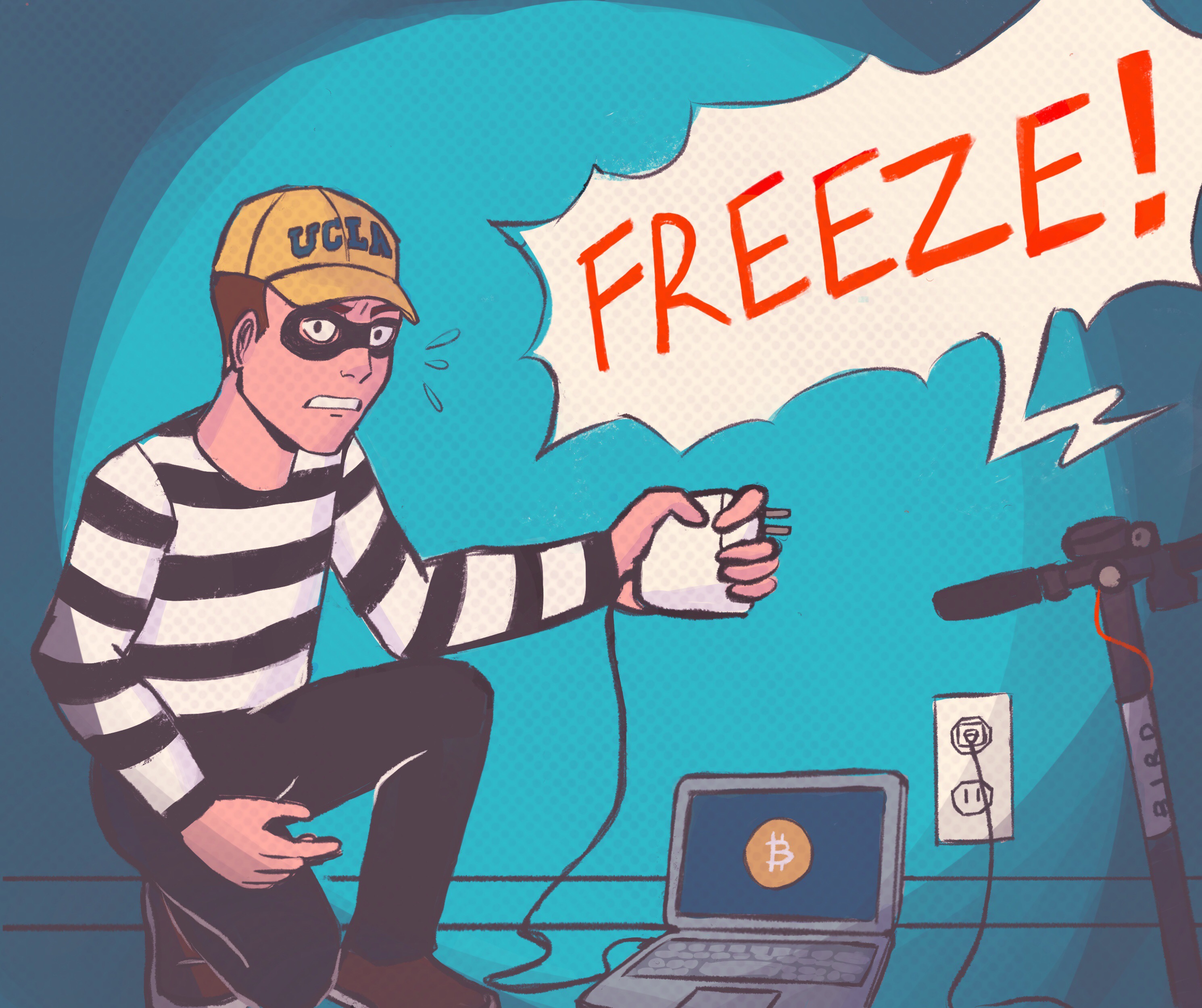Cade Mallett: UCLA students should have fairer opportunities to engage in the gig economy

(Courtney Fortier/Daily Bruin
By Cade Mallett
Aug. 13, 2018 12:38 a.m.
The sharing economy, the brainchild of tech-savvy capitalism, has opened up several new streams of passive income for those in the know. Ironically, though, those who want to find themselves in this know experience some of the most ardent resistance from universities.
Students at UCLA are no strangers to the electric scooter craze sweeping California. In fact, the city of Santa Monica was ground zero for the pilot program of this questionable instance of tech bro overreach. Nor are Bruins strangers to cryptocurrencies like Bitcoin and blockchain technologies, as evidenced by the formation of on-campus club Blockchain at UCLA, just one of several student organizations at UCLA working with blockchain technology.
Like Uber did for people with cars, these technologies let anyone with an outlet turn a profit. Mining cryptocurrency is a way of generating a decentralized digital currency in return for verifying a shared public record of transactions. And electric scooter companies like Bird Rides Inc. offer a similar revenue stream, paying people up to $20 for recovering and charging scooters. Chargers simply have to collect Birds, charge them overnight and replace them at designated pickup areas in the morning.
As it stands, there is no fair way for students to take advantage of this kind of monetization.
Students pay a fixed fee for housing that includes a proportional share of utilities. If one student mines Bitcoin, the increased cost of the power consumed across student housing will be picked up by everyone. Douglas Wong, co-founder of Blockchain at UCLA, said mining cryptocurrencies requires electricity, and the more one wants to mine, the more power one needs to input.
This equates to some people leveraging access to electricity for personal profit, with the whole of the dorm population paying for it. Though UCLA currently has no regulations preventing such use, it’s clear enough that such behaviors abuse the students who don’t have the interest, time or expensive hardware to pursue the same ventures.
UCLA doesn’t have a system in place that allows students to pay for electricity they use for commercial purposes. It should make this service available to students, just as any housing vendor that charges for utilities does.
As Bird scooters and crypto mining become increasingly popular, UCLA Housing can expect power usage in the dorms to go up. Bird scooters are already a common presence on campus. And the mining network for Bitcoin, just one type of cryptocurrency among more than 1500, consumes enough electricity to power just over 285,000 homes, about a fifth of the homes in the city of Los Angeles.
Despite this extravagance, few universities raise an official objection. Schools like the Massachusetts Institute of Technology, Stanford and the Singapore University of Technology and Design have publicly declined to comment on the issue of mining in their dorms, despite testimonials of students doing so. UCLA also declined requests for comment on its policy for power consumption.
Part of the challenge is that it can be difficult to track offending students. MIT, for example, monitors power consumption by building rather than by room. This means schools have no easy avenue to effectively outlaw electricity profiteering.
The naive solution, then, is to ban charging, mining and similar pursuits in the dorms, and impose stiff enough penalties that although the odds of being caught are slim, most students will still avoid them. But students need fairer, not fewer, opportunities to engage in such types of passive income.
Such forms of tech-savvy passive income can also be entertaining and educational, which may be why they have also found their greatest footing among young people. According to Coin Dance’s Bitcoin statistics, more than 60 percent of owners of Bitcoin are under 35. The Atlantic points to teens and young adults as the premier participants in Bird charging, comparing it to Pokemon Go with a finder’s fee.
Adam Spar, a founding team member of Blockchain at UCLA, said blockchain has extraordinary potential to revolutionize far-reaching sectors of society.
“Blockchain is already contemplated as a tool for traditional financial services, supply chain management, identity verification, data storage, prediction markets and even governing and automating economic policy,” he said.
Since so many markets are trending toward it, engaging with blockchain in an educational context, like university, would allow students to bring a whole new value and experience to the workforce.
Thus, universities shouldn’t jump to enforcing a no-holds-barred ban of profiting from the school’s outlets. After all, if students can tutor in the spaces around their dorms through services like Tutorfly, they may well expect that they can participate in other digital sectors of a gig economy.
This could look something like UCLA’s newly installed makerspace at Rieber Hall, a room open to students to work with technical tools that aren’t accessible from the dorms. UCLA could provide a space with little more than a bank of outlets where students can come in, reserve a few and pay at cost for the power used and maintenance of the space.
Some could argue that students have no grounds to resell the university’s electricity, but that portrayal is an oversimplification. Electricity is a necessary input, but not the entirety of the service that students want to provide. People who charge Bird scooters, for example, aren’t getting paid for supplying electricity, but for the labor of collecting scooters. If students paid for the power they consumed, they would still turn a profit. And with blockchain technology, the miner is paid not for electricity, but for performing computational work that verifies a ledger of transactions.
Considering UCLA hasn’t even begun to mediate students’ interest in gig economy, it seems we’re a far cry away from their offering an alternative, fairer infrastructure. There are certain to be numerous attempts to address the fairness and responsibility of popular, profitable student pastimes, but the key is to first get the ball rolling.

